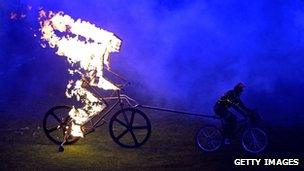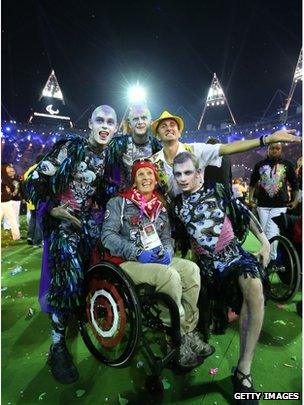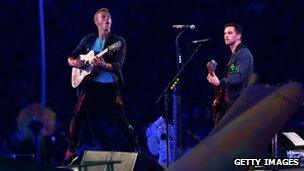Paralympics: Britons refuse to let go of Games
- Published
Acrobats and dancers performed to live music from Coldplay and other artists in what was described as a festival of fire
The overwhelming sense at the end of the Paralympic Games closing ceremony was one of disbelief.
People refusing to believe that the London 2012 Games, seven years in the making and more than a month in the doing, had finally ended.
Fans not wanting to take in the fact that there would be no more waking up to read news of British gold medal wins, no more anticipating who had the chance of glory that day and no more watching, either on TV or in person, sports to which usually they would not give even a second thought.
And what about the feel-good factor which has been so evident since the start of the Olympics at the end of July?
People seem determined to hold on to that for as long as possible - and that was proved in Olympic Park straight after the ceremony had finished.
While thousands drifted away to the various stations and thoughts of Monday morning blues, others did not want to let go of the dream.

Organisers dubbed the ceremony the "festival of flame"
Giant conga
Some Brazilian drumming and impromptu dancing near the Stratford Gate was just one example.
But walking further round the stadium, you came across a band giving a mini-concert with around two hundred people joining in.
The atmosphere was amazing with the crowd, made up of fans, Games Makers and security staff, dancing and singing along and imploring the musicians, who were playing brass instruments, to keep playing.
"One more song" they chanted to keep the festivities going - and when they were rewarded they responded with a giant conga.
Strangers grabbed hold of people they had never met before as the line weaved its way in and out of the other celebrants in an amazing example of human exuberance.
One Games Maker told me that her train was due to leave in half an hour but that she had no intention of getting it and that they would have to drag her out of the Park, such was her desire not to let the moment end.
And in the half hour I spent witnessing and taking part in this party the spirit of the Paralympic and Olympic Games in London this summer was summed up.
Right from the start people have embraced it, celebrated it and wanted to be a part of it.
Olympic or Paralympic - it made no difference to sports-mad Britons who bought tickets for whatever event in whatever Games they could lay their hands on.
Athletes centre stage
Seb Coe, chairman of organisers Locog, said before the Paralympics that he wanted people to appreciate the quality of the sport and that is what they did with David Weir feted just as much as Jessica Ennis.
And that is why it was fitting that, in the final ceremony of the Games on Sunday night, the athletes were centre stage.
They marched in casually and sat on seats around the edge of the grass area in the Stadium which had been used for field events.
It meant they could watch the whole show, rather than just the end of it, and appreciate the whole spectacular evening.
They were so relaxed that some of them tried to start a Mexican wave before the ceremony got under way.

The feel-good atmosphere in the stadium was infectious
Other people feted on the night were the armed forces and the Games Maker volunteers, who received a massive cheer from the crowd.
Coldplay and Rihanna had the crowd rocking and a spectacular light display made for some brilliant viewing.
The ideas of flames and of moving through the seasons signalled the continuation of life - a message to the millions of people who were disappointed at the Games' end.
So what comes next?
In the immediate short-term, the celebrations will continue for one more day with the parade of Olympic and Paralympic athletes through central London on Monday.
But what happens after that which is also important - millions of people will take away wonderful memories of attending or watching the Games which will last for years to come.
However the sports themselves need participation and interest in order to maintain the momentum built up.
A festival of disability sports is planned before the end of the year, during which people can try out the sports for themselves, and maybe take them up.
But if interest in disbility sports is to continue, organisers know media coverage is key.

Coldplay performed a selection of their songs
During both the Olympics and Paralympics, the Games have regularly featured on both the front and back pages of the newspapers with special supplements published in the middle.
However Lord Coe is worried that interest may fade quickly. He expressed disappointment that England's World Cup qualifying win in Moldova knocked the Paralympics off the back pages on Saturday morning.
But that is for the future and this is still the time to reflect on what International Paralmpic Committee president Sir Philip Craven described as "the greatest Paralympic Games ever".
And on the achievements of Britain in staging such successful Games as Lord Coe explained in his speech:
"There are some famous words you can find stamped on the bottom of a product. Words, that when you read them, you know mean high quality, mean skill, mean creativity.
"We have stamped those words on the Olympic and Paralympic games of London 2012.
"London 2012. Made in Britain."
- Published10 September 2012
- Published10 September 2012